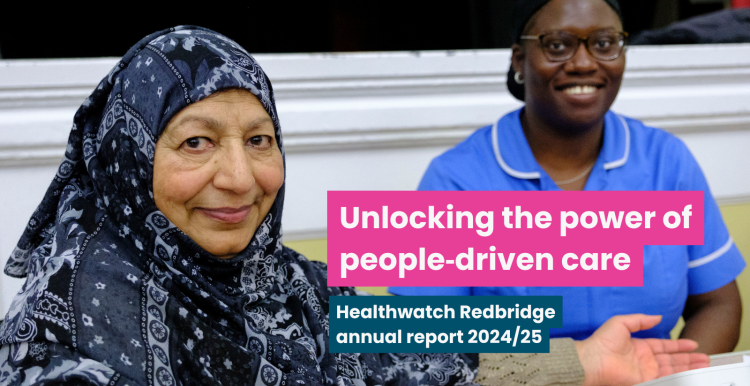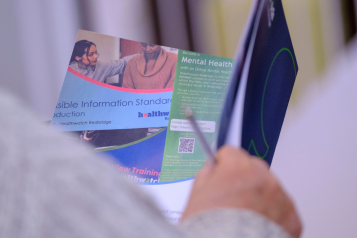Healthwatch Redbridge reflects on a year of championing change

Healthwatch was established under the Health and Social Care Act 2012 to champion the public voice. Since then, the stories people have shared with us have made real, positive change, and this year has been no different.
In telling their stories, members of the public have demonstrated the power they have to show how our health and social care system is and isn’t working. They have been pivotal not only in identifying the issues, but in highlighting how to make real and lasting change.
Throughout the year, hundreds of people came to us to share their experiences of health and social care, we heard how the needs of our local Deaf community were dismissed at appointments, women’s hesitations and fears at attending intimate examinations, and how parents are struggling to find SEN support for their children.
The Healthwatch Redbridge Community Network has grown, and we have supported projects to hear from Redbridge’s LGBTQ+ community about their experiences accessing services, and how young people from diverse backgrounds want responsive and culturally competent mental health support.
Acting on what you have shared with us; we have worked in partnership with the London Borough of Redbridge and service providers to make key recommendations for change. We have championed the voice of local people, putting their experiences on the national agenda, and we have delivered comprehensive information to empower Redbridge residents to advocate for their needs.
“Thanks to Healthwatch Redbridge, more patients in our borough know what they are entitled to ask for when receiving health care, and are better equipped to communicate their needs efficiently.” - Nicky Summers, Public Health Delivery Team, London Borough of Redbridge
All of this was only possible because of the people who shared their stories with us.
A network of networks
Every member of the community should have the chance to share their story and play a part in shaping services to meet their needs. One way we achieve this is by working with organisations across the borough who have deep-seated connections with diverse communities in Redbridge who face health inequalities
This year, we have reached different communities by:
- Supporting local community organisations to deliver outstanding projects we have developed community partnerships that address local people’s needs directly.
- Holding our Community Fair at Redbridge Town Hall we brought people together to access services, building trust and relationships across the borough.
"The Networking community [Healthwatch Redbridge] have created is a fantastic platform for organisations, groups and individuals to connect and collaborate." - Cherrill Hutchinson, Director and Founder of Black Woman’s Kindness Initiative
The voices driving our work
Throughout our report, you can read just some of the stories that help us understand the struggles people face when it comes to their care, and how things can be better.
Among them is Eleesha. Eleesha was pursuing an autism diagnosis for her daughter, and facing a year long waiting list, invoked her right to choose a provider for an assessment.
When her GP practice was skeptical of her right to choose and unwilling to accept the provider Eleesha turned to us. Putting pressure on the ICB to inform the practice of her rights, our intervention helped resolve the issue, and Eleesha’s daughter received a referral and assessment.
“It was a blessing to find Healthwatch as they took responsibility for helping me get the information I needed from the ICB. Without their willingness to keep going until the information was provided, I would still be banging my head against a wall feeling like the GP surgery did not want to help my daughter get something that I knew she was entitled to.” - Eleesha
The role of volunteers
Thanks to the fantastic dedication and commitment of our volunteers to improving care, we can better understand what is working and what needs improving in our community.
One volunteer, who joined us this year, Nuha, told us about what working on our Women's Health Project meant to her.
“As the child of immigrant parents, I often found myself translating at appointments, and navigating a healthcare system that wasn’t built for families like mine.
Whilst volunteering, I supported the delivery of in‑person information sessions and community events, helped recruit and interview women... I had the chance to meet women from all walks of life: strong, outspoken, resilient.
For me, this role has always been about being a voice for women like my mum, those who are expected to accept barriers in silence. Volunteering here reminded me that real change starts by listening." ‑ Nuha
Continuing to champion the voices of local people as the Healthwatch network experiences change
The Government has recently announced its plans to disband the Healthwatch network, and change the law to:
- Transfer the work of Healthwatch England to the Department of Health and Social Care.
-
Transfer the work of local Healthwatch services to the NHS and local authorities.
These changes will happen over time. This means we are still here, open, and working for you. We continue to:
-
Listen to your experiences of health and social care.
-
Share what we hear with those in power to help improve services.
-
Provide advice and information to help you find the support you need.


